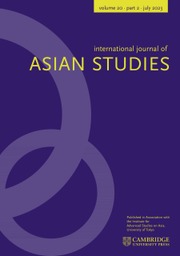Article contents
THE SINO-VIETNAMESE DISPUTE OVER TERRITORIAL CLAIMS, 1974–1978: VIETNAMESE NATIONALISM AND ITS CONSEQUENCES
Published online by Cambridge University Press: 21 June 2011
Abstract
Relying on Vietnamese internal government documents now available to scholars for consultation in the No. 3 Vietnam National Archive in Hanoi, this article examines the linkage between the escalated Sino-Vietnamese territorial dispute and the increased Vietnamese mistreatment of Chinese residents and experts in northern Vietnam from 1974 to 1978 owing to state-sponsored Vietnamese anti-China/irredentist nationalism. During this period, Vietnamese leaders were seeking to forge national unity, solidify popular loyalty to the state, and mobilize domestic resources to defend the Vietnamese “fatherland” against the threat of Chinese territorial expansion. Specifically, this article demonstrates how these policies encouraged mistreatment of Chinese residents and experts, and created a climate of fear and paranoia within the Chinese community which caused the widespread flight of Chinese from northern Vietnam in 1977–1978.
- Type
- Research Article
- Information
- Copyright
- Copyright © Cambridge University Press 2011
References
REFERENCES
- 10
- Cited by


